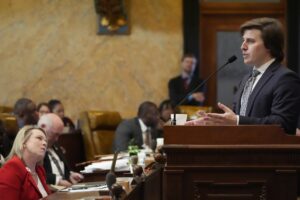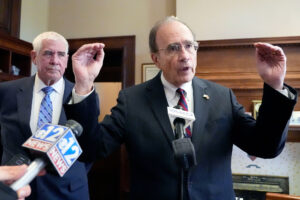After several of Mississippi’s top officials, including Gov. Tate Reeves, criticized a new program designed to incentivize the growth of solar energy in schools and residential areas, the Mississippi Public Service Commission met today to reaffirm its support for the policy. Critics claim it will raise energy costs for customers statewide.
Northern District Commissioner Brandon Presley, a supporter of the program, spoke out after the vote at today’s meeting.
“I find it so strange that people that would write letters to this agency telling us to support a 45% rate increase for a failed clean coal plant now want to mischaracterize what we’re trying to do,” he said, while referencing a defunct “clean coal” project in Kemper County that Reeves once supported. “I don’t know if they can’t add or subtract.”
Net metering is a process by which residents can generate their own solar energy and sell it back to the power grid during times of peak consumption, defraying costs and helping to contribute to the state’s overall energy supply.
In July, the PSC voted 2-1 to expand the program, offering a higher rate of reimbursement to low-income adopters and providing a $3,000 credit for some households that install solar panels. Today, the PSC voted by the same margin to maintain the rules despite the complaints of the governor and other state leaders.
In an interview with the Mississippi Free Press this morning, Presley fired back at critics of the new rules, explaining that the average customer would be looking at a cost of $1.18 a month if the program were somehow able to attract the maximum of 9,000 new solar customers.
“At that point, you’re probably talking about a mix of 9,000 whole residential customers that received the energy independence incentive,” he said. That would represent over a sixteen-fold increase in the amount of solar-equipped residences in the state. Less utilization of the incentive program would mean rates would increase even less than that.
“This is not the impression you would get from people acting as if the sky is falling, that rates are going up like that. These are many of the same people who did not bat an eye in supporting the (Kemper County Coal Plant) that ended up costing $7 billion and cost the rate payers almost $1 billion, and would’ve been a 45% rate increase.”
Reeves Links Rules to ‘Woke Biden Policies’
The PSC is a three-member commission that serves three separate state districts. Presley, a Democrat who represents the northern district, and Brent Bailey, a Republican who represents the central district, supported the new solar policy. Republican Dane Maxwell, who represents the southern district, voted against it.
On Monday, Gov. Tate Reeves has joined other prominent Republicans in opposing the new program.

“Woke Biden policies have driven the cost of energy too high for Americans,” Reeves wrote on social media yesterday. “Now, the MS Public Service Commission is prepping to vote again to make you pay more each month so that some homes – only those that they choose – can get money to install solar panels. Bad ‘net metering’ means more expensive energy for you – MS ratepayers. It’s a bad deal. The PSC should slow down. If not, the legislature must reverse it.”
Commissioner Maxwell and Secretary of State Michael Watson registered their disapproval of the plan when it first passed in July.
“Missippians (sic) shouldn’t be forced to pay higher utility rates to fund rebates for those who install solar panels,” Watson wrote in part. “This is another tax straight out of the Biden administration’s playbook.”
Reeves’ use of “woke” refers to a term that originated in Black culture to describe enlightenment on issues of systemic racism and related social issues. But many white Republicans in recent years, including Watson, have adopted it as a broad epithet to mock ideas they disagree with.
‘Power Even After A Storm’
Maxwell explained his opposition to the new solar rules in an interview with Y’all Politics. “As more and more net metering customers come on-line, the utilities will incur additional costs in the form of above avoided cost energy purchases for excess energy put on the grid by net metering customers.”
Maxwell acknowledged then that the costs would be “difficult to quantify,” but that Mississippi’s two energy giants, Entergy and Mississippi Power, would recoup the costs through utility rate increases.
Presley pointed out that the use of these subsidies would demand significant personal investment, too. “You’ve also got to understand that those same customers are putting up 75% of their own money. This $3,000 incentive that we’re talking about will only cover somewhere between 20% and 25% of the actual cost (of a new solar system). It has to be a vast-majority private investment,” Presley said. A secondary incentive of $2,000 exists for customers who add a battery to their solar array to store excess energy.
A stopgap measure exists to pause the program if Mississippi’s energy load somehow shifts too far in favor of solar.
“Once either residential solar or solar for schools reaches 47 megawatts for Mississippi Power customers and 94 for Entergy customers, which gives you 141 megawatts total, this program policy pauses and doesn’t grow until the commission comes back to make a redetermination,” Presley explained.
He said an investment in solar capacity would pay dividends to all residents in the form of increased energy independence and grid resiliency.
“We’re bringing on a source that is not dependent upon international energy markets. That adds to the resiliency of the whole electric system related to storm restoration and energy savings. We’re incentivizing battery storage, which allows customers to continue to have power even after a storm,” Presley said.
“People had almost 21 months to be engaged in this,” the northern district commissioner added. “And you can’t understand these types of things at the very last minute and then weigh in on public policy. You can’t do it. It’s too complex.”
Commissioner Maxwell did not return requests for a comment from the Mississippi Free Press. At today’s PSC meeting, he did not contest Presley’s estimate of $1.18 a month in average rate increases, but framed his opposition to the subsidies as a principled stance.
“One group would bear the burden, but the other group would gain the benefit,” Maxwell said. “This is the law I apply when I issue orders and costs on cost and rates … I draw the line on (making) any of my constituents pay more than others to have their lights on 24 hours a day, 365 days a year.










